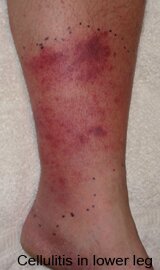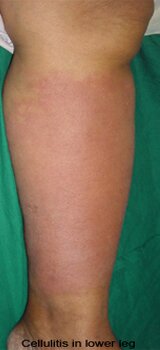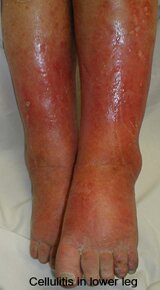

Description
Cellulitis of the legs is defined as an skin infection on the leg which is manifested by redness, swelling, pain and warmth.The lymph nodes in the body may also become swollen and tender. People of all ages can be infected by cellulitis in lower leg. Except on the lower leg, infections can occur anywhere on the human organic structure (systematic symptoms).Even so, this infection mostly attacks legs, hands and feet. Previously named types of cellulitis are usually known as cellulitis of extremities. Details about cellulitis foot infection find on new page here.
Symptoms and Signs
Symptoms and signs of cellulitis in lower leg may take place at the location of the infected region of patient's skin (local symptoms), or they can take place along several parts of the human organic structure (known as systematic cellulitis symptoms). Cellulitis symptoms and signs page describe more particulars about symptoms of this medical condition.
Cellulitis in Lower Leg Bacterial Causes
Cellulitis in lower leg is an disease induced by bacteria. Streptococcus group A bacteria is the most common cause of Cellulitis in lower leg in otherwise healthy adults. This bacteria is usually found on the skin and in the throat . Some other cause of cellulitis in lower leg in adults is a bacteria Staphylococcus Aureus , usually found on human skin and lining of mouth and nose (also known as mucosa). The most common cause of lower leg cellulitis in children under 3 years old is Haemophilus Influenzae type B (Hib). This bacteria can cause serious infection. More details about causes are placed on cellulitis causes page.
Specific and General Risk Factors
Medical discoveries in the area of cellulitis was revealed that individuals with certain risk factors have a greater tendency to cellulitis in lower leg than others.General risk factors including following:Vein troubles; Problems with the lymphatic system; Breaks in the skin; Obesity; Swelling of the leg. Specific risk factors for cellulitis in lower leg include: Skin ulcer (diabetic ulcer); Surgical wounds; Radiation therapy; Eczema, Psoriasis or other skin conditions that may get a break in the skin; A previous episode of cellulitis; Coronary arthery bypass surgery; IV antibiotics use; Chemotheraphy; Pregnancy; Certain other conditions including HIVor AIDS, Diabetes, Leukemia, Lymphoma, Psoriasis, Lupus, Dyshidrosis and Heart failure.
Risk factors for cellulitis in lower leg are not a direct cause of these type of cellulitis, but risk factors still increase the chances of disease development. Individuals who believe that they may be at risk for cellulitis in lower leg should talk about with their medical practitioner.Certain details also can be found on cellulitis risk factors page.
Diagnosing
Doctors usually diagnose cellulitis in lower leg by analyzing the patient's medical history,performing a physical examination and ordering blood test. Looking at the infected area of skin is most reliable way of diagnosing cellulitis in lower leg. Affected area probably will be: swollen, red, warm and painful to touch. Medical adviser will also look for breaks in the skin (scrapes, cuts, bruises, ulcers, skin conditions) where bacteria could be entered into patient's body. Medical practitioner will order an blood test in case if there is any indication of cellulitis infwction. Procedure of diagnosing please visit on cellulitis diagnosis page.
Cellulitis in Lower Leg Treatment
The aim of cellulitis in lower leg treatment is treatment the affected skin area and any underlying shapes that may increase the likeliness of a return of cellulitis. Effective treatment involves healing process include antibiotics and recurrence prevention. Antibiotics are usual first line of treatment, so if you have any allergic reaction on penicillin you must tell your medical adviser. During healing period for cellulitis in lower leg you should keep the infected leg elevated and use cold compress to help reduce pain.
Medical research has shown that 50% of individuals who receive treatment experience a recurrence (return) of cellulitis in lower leg. In this case medical adviser may prescribe antibiotics drugs for a longer period of time. More detailed about how to treat cellulitis find on cellulitis treatment page.
Cellulitis Types
More About Cellulitis

Home - - Privacy - Additional Information
![]()